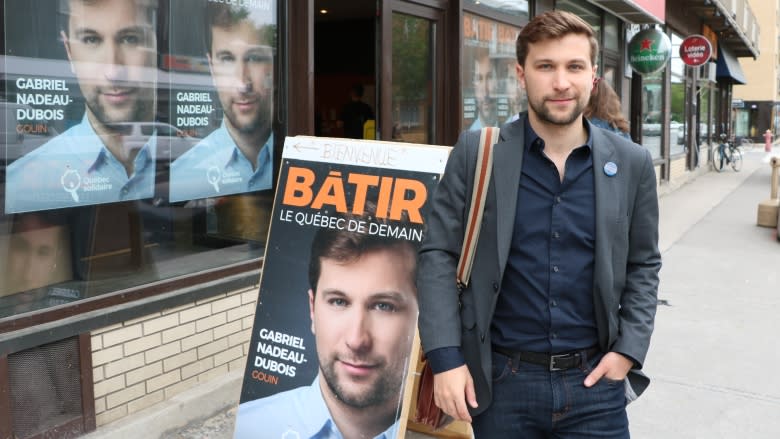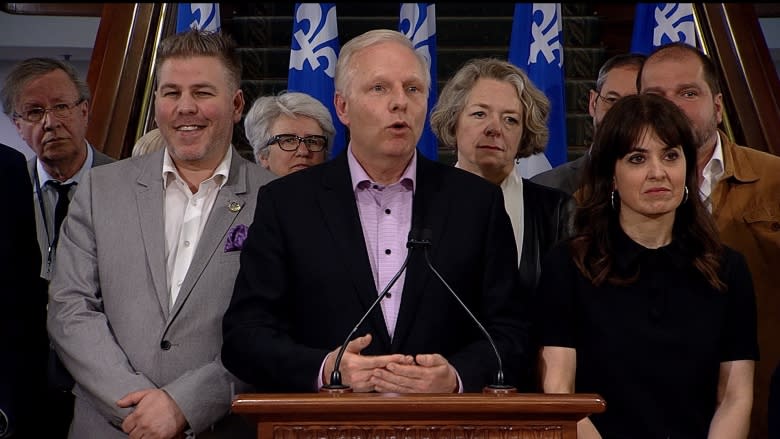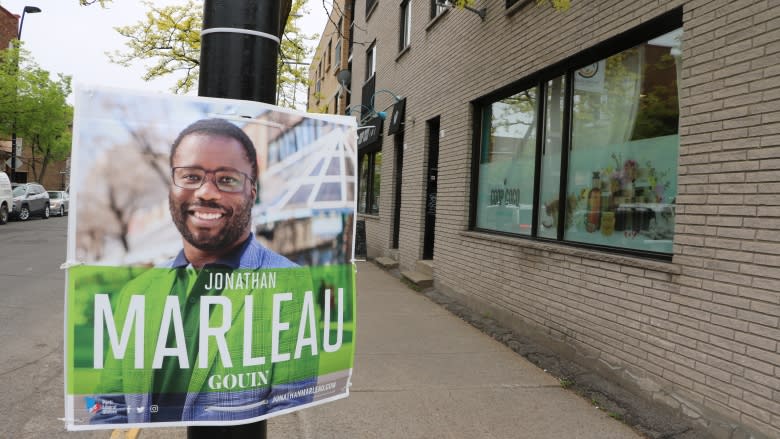Amid sovereignist infighting, Québec Solidaire looks to gain momentum in Gouin byelection
A walk into Gabriel Nadeau-Dubois's campaign office can feel a little like a walk back in time — five years back, to be exact.
The former student leader, a powerful political force during the student unrest of 2012, has brought familiar faces from the red square movement on board for the Gouin byelection.
One afternoon this week, Renaud Poirier St-Pierre, his press attaché dating back to the days of casseroles protests, confers with a group of young volunteers hunched over laptops, while a group of older women — holdovers from the days of Françoise David — make cold calls to undecided voters.
"What is beautiful in this campaign is that we have a mix of people that I have been working with since the student mobilization of 2012, but also people who have been working for Françoise in the last years," Nadeau-Dubois, now 26, said in an interview.
Nadeau is hoping that mix resonates with voters when they go to the polls Monday to choose a replacement for David, one of Québec Solidaire's founders, who quit politics earlier this year.
The byelection is viewed as the first big test for Québec Solidaire since the party chose Nadeau-Dubois and MNA Mannon Massé as its co-spokespeople — and rejected a proposed strategic alliance with the Parti Québécois.
Nadeau-Dubois is the perceived frontrunner in a crowded field of 13 candidates.
His chief opponents are Liberal Jonathan Marleau, who up until the start of his byelection campaign was the head of party's youth wing, Benjamin Bélair, a philosophy teacher for Coalition Avenir Québec, Option Nationale's Vanessa Dion and Quebec Green Party leader Alex Tyrrell.
Bélair, at 39 years old, is the oldest of the five.
Fallout from sovereignty squabble?
The Parti Québécois opted not to run a candidate in Gouin, where David won with more than 50 per cent of the popular vote in 2014.
That decision was made long before last week, when Québec Solidaire rejected the proposed alliance at its annual convention.
PQ leader Jean-François Lisée has attacked QS in the days since, saying the decision was made by "radicals" in the party's "Politburo" and at odds with the wishes of most progressives in the province.
Québec Solidaire holds only two seats in the National Assembly, but is seen as a threat to the PQ's left flank, potentially siphoning crucial votes in tight races in next year's general election.
Speaking at his office, Nadeau-Dubois acknowledged he had been bracing for a "huge backlash" from voters for the decision to spurn the PQ, but said there hasn't been much talk of the decision on the campaign trail.
"For the moment, we don't hear a lot, honestly," said Nadeau-Dubois.
Nadeau-Dubois, who led a series of discussion forums across the province last year, stressed the need for increased school funding and improved environmental protection during the campaign.
Gouin, a riding made up of students and young families in parts of La Petite-Patrie along with parts of Rosemont, has traditionally voted PQ, but shifted to Québec Solidaire following the student protests.
"Gouin was in 2012 one of the strongholds of the casseroles movement. It's a very mobilized neighbourhood for years, they have been against the austerity measures of the Liberal government," Nadeau-Dubois said.
Liberals hope to capitalize
Marleau, for his part, has tried to bill himself as a different kind of Liberal, even inviting disappointed PQ supporters to give him their vote.
At his campaign launch last month alongside Premier Philippe Couillard, Marleau pointed out that, like Nadeau-Dubois, he also wore a red square, banged pots and pans and "denounced systemic racism."
"I'm black. I am a member of the LGBTQ community, I come from a low-income family, I am a public school student, I am currently studying at UQAM and I am a member of the Liberal Party of Quebec," he said.
On Sunday, he was still going door-to-door, making a final pitch to voters.
"I'm not running against Gabriel Nadeau-Dubois, I'm running for the people of Gouin," Marleau said.
"People were expecting some kind of convergence and I get the sense supporters of the Parti Québécois are disappointed, and they're looking for another option."
Polls are open Monday between 9:30 a.m. and 8 p.m. About seven per cent of eligible voters cast a ballot in advanced polls.




